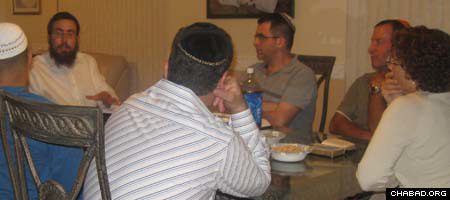Thanks to an ever-increasing stream of expatriate Israelis moving to the United States, pockets of Hebrew-speaking communities have popped up all over the country's Northeast and West, and in Florida, over the past decade. And while those who move do so because of economics, international politics, and a hankering for good old American culture, a cadre of Chasidic families are helping to ensure that these transplants from the Holy Land embrace a Jewish identity that could have easily been left behind.
"The U.S. is kind of a heaven place," says Felix Rudiak, a native of Israel's southern coastal port of Ashkelon, in explaining that many of his compatriots view America as the bearer of material benefits and a higher quality of life.
U.S. Census Bureau figures illustrate the trend: While, some 109,720 Israeli citizens were living in the country in 2000, the population jumped to 122,497 just four years later. In 2006, 135,003 Israelis had American addresses, mostly in the states of New York, New Jersey, California and Florida. Today, more than a dozen Chabad-Lubavitch centers in the United States – in places like Atlanta, Chicago, Staten Island, Philadelphia and Boca Raton, Fla., where the new Chabad Israeli Center directed by Rabbi Naftali and Henya Hertzel opened in 2006 – cater almost exclusively to the Israeli set; dozens more offer classes taught in Hebrew, special parties for Israelis and networking events.
A family of Chabad.org-powered Web sites also maintain a presence on the Internet for American-based Israelis looking for Jewish information and updates about their local Chabad Houses. The sites pull articles and other content from Chabad.org's Hebrew flagship He.Chabad.org.
Six years ago, Rudiak and his family moved to Tenafly, N.J., a New York City suburb popular among Israelis. But soon after their move, he and his wife, while pleased that their children were adjusting to U.S. customs and the public school system, felt that something was "missing."
In their home country, businesses are closed on Shabbat, many streets go quiet on Yom Kippur and even the most decidedly secular of citizens are so familiar with biblical stories that they use them as metaphors. In America, on the other hand, says Rudiak, one has to fight to maintain their Jewish connection.
"Maybe it's because in Israel, you already feel connected," he offers. "You feel the country is holy enough."
Longing for home is a common phenomenon among many immigrant groups. On its Web site, Rutgers University counsels foreign students to "be secure in your sense of who and what you are. In the process of adjusting to living in the United States, don't lose sight of the many good qualities of your own culture."
The Rudiaks, fearing that their children could perhaps lose their Jewish identity as a result of immersion in American culture, sought out common ground. They found it Chabad-Lubavitch of the Palisades in Tenafly, which has many Hebrew-speaking programs specifically geared to the community's Israeli population.
Rudiak first contacted Rabbi Mordechai Shain, the center's executive director, when his son Matanel began studying for his bar mitzvah. Both father and son began to pray daily at the synagogue; the experience led to Matanel's enrollment in a Jewish day school in nearby Paramus.
"You are fortunate to meet such people as Rabbi Shain that really will guide you and explain [things to] you, and show you their compassion and love," says Rudiak. "Many [non-religious] Israelis are afraid of Orthodox people, thinking that the Orthodox [will view them as] sinners."
But Shain's approach, echoed by the thousands of Chabad-Lubavitch emissaries worldwide, is decidedly non-judgmental, explains Rudiak. The entire message of the Chabad House is that "we will love you, because you are Jewish. And, by the way, we'll try to show you [the way of] the Torah.' "
A Cookie and Tefillin

It might be ironic, but for people like Rudiak, moving away from Israel gave them a spiritual push to explore their Judaism. Rabbi Amitai Yemini, director of the Chabad Israel Center in Los Angeles, explains that it has a lot to do with the differences between each country's way of life.
"A person in Israel is under pressure," he says, referring to the almost constant threat of regional warfare in the Middle East. "Here, in contrast, people wake up in the morning, they drink coffee, they talk here and they talk there. They do their jobs without pressure. They have more time to listen to what a rabbi will tell them."
After he completed his Israeli army service, Danny Weiss wanted to explore the world. He attests that he settled in Boca Raton, Fla. – where pita shops and falafel bars serve as markers of a large Israeli community – as a "totally secular Jew, totally against religion and religious Jews."
Then he met a Chabad-Lubavitch Chasid who came to his workplace every Friday with some cookies and a pair of tefillin. The ritual appealed to Weiss, as did the fact that the Chasid could personally relate to him. The experience eventually led him to Rabbi Moishe Denburg, the director of Chabad-Lubavitch of Boca Raton.
"In the beginning, it was more for the cookie," says Weiss, "but later on, I started to join the synagogue for High Holiday services."
Weiss' involvement continued to grow, and when his daughter entered the first grade, he enrolled her in Chabad's Hebrew Academy in nearby Margate. He sent his next six children to Chabad schools.
The children "brought Yiddishkeit home," says Weiss.
His friend, Israeli-born Shimshon Hazan, adds that emissaries like Denburg "wake up the Jewish soul."





Start a Discussion